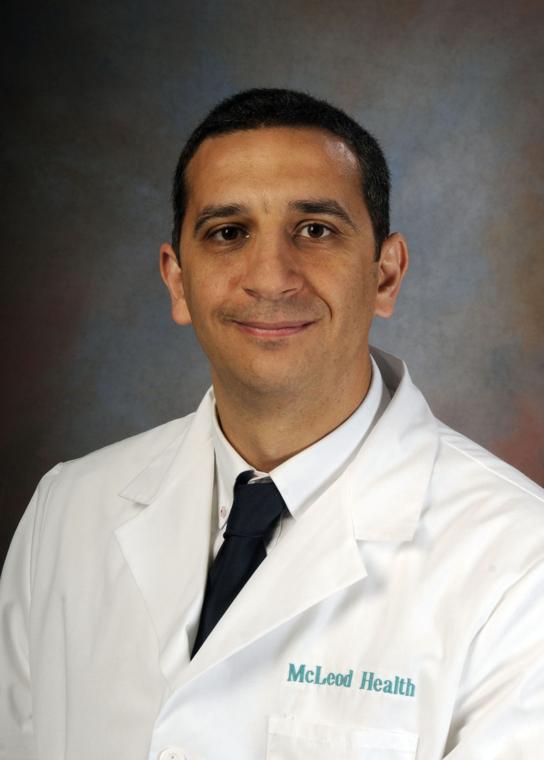|
Alsaka leads new physician practice: McLeod Nephrology Associates - SCNow |
 |
 |

Adnan Alsaka, M.D.
Posted: Tuesday, August 11, 2015 9:13 am
Alsaka leads new physician practice: McLeod Nephrology Associates Local reports Morning News
FLORENCE, S.C. -- McLeod Health and McLeod Physician Associates welcome Adnan Alsaka, M.D. to the medical staff and to the newly established McLeod Nephrology Associates. Alsaka comes to McLeod from LifePoint Hospitals Inc. in northern Louisiana, where he served as the Director of Hemodialysis and Intensive Care Unit.
As a board certified nephrologist, Alsaka specializes in kidney care and treating diseases of the kidneys. Commonly treated conditions include chronic kidney disease (CKD), polycystic kidney disease (PKD), acute renal failure, kidney stones, high blood pressure, and all aspects of kidney transplantation and dialysis.
An online service is needed to view this article in its entirety. You need an online service to view this article in its entirety.
Have an online subscription?
Login Now
Need an online subscription?
Subscribe
Login
Haven’t signed up for All Access yet? Get started here…
Need more information about All Access? Get all of the details here.
If you are a current subscriber and haven’t signed up for All Access yet, get started here.
Choose an online service.
The following services are print only and offer no digital access
Need an account? Create one now.
Haven’t signed up for All Access yet? Get started here…
Need more information about All Access? Get all of the details here.
If you are a current subscriber and haven’t signed up for All Access yet, get started here.
kAmp=D2<2 D2:5 96 :D 6I4:E65 E@ 364@>6 A2CE @7 E96 723C:4 @7 |4{6@5 w62=E9[ 2?5 2=@?8 H:E9 9:D H:76 2?5 E9C66 49:=5C6?[ E@ ;@:? E96 u=@C6?46 4@>>F?:EJ]k^Am kAmQ|4{6@5 AC@>@E6D 6I46==6?46 :? 962=E942C6[Q D2:5 p=D2<2[ Qx =@@< 7@CH2C5 E@ AC@G:5:?8 67764E:G6 962=E942C6 2D A2CE @7 2 A2E:6?E\46?E6C65 E62>]Qk^Am kAmp=D2<2 :D 2446AE:?8 ?6H A2E:6?ED 3J 2AA@:?E>6?E 2?5 C676CC2=] %@ >2<6 2? 2AA@:?E>6?E[ 42== gcb\fff \fah_]k^Am kAmu@C 7FCE96C :?7@C>2E:@? 23@FE |4{6@5 w62=E9 2?5 |4{6@5 !9JD:4:2? pDD@4:2E6D[ G:D:E E96 H63D:E6D k2 9C67lQ9EEAi^^HHH]>4=6@5962=E9]@C8QmHHH]>4=6@5962=E9]@C8k^2m 2?5 k2 9C67lQ9EEAi^^HHH]>4=6@5A9JD:4:2?D]@C8QmHHH]>4=6@5A9JD:4:2?D]@C8k^2m]k^Am
© 2015 SCNow. All rights reserved. This material may not be published, broadcast, rewritten or redistributed.
Thank you for reading 15 free articles on our site. You can come back at the end of your 30-day period for another 15 free articles, or you can purchase a subscription and continue to enjoy valuable local news and information. If you need help, please contact our office at 843-317-NEWS. You need an online service to view this article in its entirety.
Have an online subscription?
Login Now
Need an online subscription?
Subscribe
Login
Haven’t signed up for All Access yet? Get started here…
Need more information about All Access? Get all of the details here.
If you are a current subscriber and haven’t signed up for All Access yet, get started here.
Choose an online service.
The following services are print only and offer no digital access
Need an account? Create one now.
Posted in Business, People on Tuesday, August 11, 2015 9:13 am.
|
|
Argos Therapeutics begins AGS-003 clinical trial in patients with metastatic ... - News-Medical.net |
 |
 |
|
Single-center study is enrolling patients at Roswell Park Cancer Institute in Buffalo, New York.
Argos Therapeutics Inc. (Nasdaq: ARGS) (“Argos”), an immuno-oncology company focused on the development and commercialization of fully individualized immunotherapies for the treatment of cancer based on the Arcelis® technology platform, today announced the initiation of a single-center pilot clinical trial of AGS-003 as a neoadjuvant immunotherapy in patients with localized renal cell carcinoma. The study is being conducted at Roswell Park Cancer Institute (RPCI) in Buffalo, New York, and is designed to enroll a maximum of ten patients who will be treated with AGS-003 before nephrectomy in order to assess immune system response and tumor effects.
“There is tremendous potential for approaches that use the body’s own defense mechanisms to treat cancer, and we are dedicated to advancing promising approaches in this rapidly expanding area of cancer research,” said Thomas Schwaab, MD, PhD, chief of strategy, business development & outreach, associate professor in the departments of urology and immunology and urology clinic director at Roswell Park Cancer Institute and principal investigator for the AGS-003 pilot study. “AGS-003 has shown strong potential in trials targeting metastatic renal cell carcinoma, and we look forward to advancing research to determine whether this therapy can help the body build an effective immune response to kill tumor cells in patients with localized disease. The goal is to develop a treatment that will interrupt the cancer’s progression before it has a chance to spread to additional organs.”
AGS-003 is an autologous dendritic-cell-based immunotherapy designed to induce a memory T-cell response specific to each patient’s unique tumor antigens. It is produced using a small sample from a patient’s own tumor and dendritic cells derived from a leukapheresis procedure. In an open-label phase 2 study, treatment with AGS-003 plus sunitinib yielded a median overall survival of more than 30 months in newly diagnosed, unfavorable-risk metastatic renal cell carcinoma patients. Argos is evaluating AGS-003 in the pivotal phase 3 ADAPT trial in combination with standard targeted therapy for the treatment of metastatic renal cell carcinoma. The ADAPT trial is fully enrolled; interim data analyses are expected next year, with final data expected in the first part of 2017.
The pilot study is in patients with localized renal cell carcinoma, who must be eligible to undergo a partial or radical nephrectomy. Patients will receive five weekly doses of AGS-003 prior to surgery and will remain in the study for approximately six months.
“With this pilot study, for the first time we will be able to assess the effects of AGS-003 in patients with kidney cancer that has not spread to nearby lymph nodes or other parts of the body,” said Charles Nicolette, chief scientific officer and vice president of research and development at Argos Therapeutics. “It is also an important opportunity to manufacture AGS-003 using a needle biopsy procedure for tumor collection prior to surgery and to directly study immune changes within the primary tumor before and after administration of AGS-003.”
http://www.argostherapeutics.com/
|
|
|
MedHOK's Software Platform Selected by Fresenius Health Partners, Inc. - GlobeNewswire (press release) |
 |
 |
|
TAMPA, Fla., Aug. 11, 2015 (GLOBE NEWSWIRE) -- MedHOK®, a pioneering software platform for health plans and other risk-bearing entities participating in government-sponsored programs, announced today that Fresenius Health Partners, a company offering comprehensive health care solutions to patients with end stage renal disease (ESRD), has selected MedHOK's platform to streamline care management for patients with ESRD and Medicare Advantage Chronic Condition Special Needs Plans (C-SNP).
Fresenius Health Partners works with a wide variety of risk-bearing entities, including Medicare Advantage plans and Accountable Care Organizations, to improve clinical outcomes, enhance quality measures, and reduce costs for patients with ESRD and chronic kidney disease.
"The challenges facing our ESRD patients are daunting, and MedHOK's integrated solution will play an integral role in our ability to effectively coordinate the multiple facets of their care," said Dan Geary, Senior Vice-President of Health Services of Fresenius Health Partners. "Our opportunity to coordinate our patients' life sustaining care and improve the day-to-day quality of their lives will be significantly enhanced using the MedHOK integrated platform."
The MedHOK software platform is comprised of fully integrated modules in the core areas of Risk, Care, and Quality, leveraging member data across both major medical and pharmacy, and enabling payers to manage revenue and costs across the healthcare enterprise in a compliant fashion. The MedHOK platform comes pre-configured with state and federal regulations, structured workflows, and analytics across all modules, breaking down the silos typically associated with member care and expense management. Fresenius will be implementing the entire platform for a seamless, end-to-end solution.
"MedHOK's member-centric approach shifts the focus from simply reporting quality measures to actually influencing results for a targeted population," said Anil Kottoor, CEO of MedHOK. "As the healthcare accountability model continues to evolve, MedHOK is at the forefront of technology solutions helping health care companies such as Fresenius meet strict compliance and clinical management requirements in order to succeed in the new value-based healthcare environment."
About MedHOK
MedHOK's pioneering software platform empowers health plans and other risk-bearing entities offering government-sponsored programs to excel in risk, quality, and care management, while ensuring compliance with federal and state requirements. The only software that integrates pharmacy and medical care on a single platform, MedHOK creates a 360o view of the member, allowing payers to identify and target member health risks, intelligently trigger workflow interventions, and improve quality of care to succeed in the value-based revenue model. Out-of-the-box compliant and proactively updated for Medicare, Medicaid, and Affordable Care Act regulations, our SaaS-based software is a compliance powerhouse.
Recognized by Inc. magazine as the nation's 25th fastest growing private company and the 6th fastest growing private healthcare company, MedHOK is NCQA certified in HEDIS®, Pay for Performance, and Disease Management. MedHOK is the software platform of choice for more than 50 of the nation's largest healthcare payers, managing close to 40 million lives. Visit www.MedHOK.com or call (888) 9MEDHOK.
About Fresenius Health Partners
Fresenius Health Partners is a wholly owned subsidiary of Fresenius Medical Care North America, the premier health care company focused on delivering the highest quality care to people with renal and other chronic conditions. Through its industry-leading network of dialysis facilities, outpatient cardiac and vascular labs, and urgent care centers, as well as the country's largest practice of hospitalist and post-acute providers, Fresenius Medical Care provides coordinated health care services at pivotal care points for hundreds of thousands of chronically ill customers throughout the continent. As the world's only vertically integrated renal company, it offers specialty pharmacy and laboratory services, and manufactures and distributes the most comprehensive line of dialysis equipment, disposable products, and renal pharmaceuticals. For more information, visit www.freseniusmedicalcare.us or www.freseniushealthpartners.com
Jan Luongo, APR
(813) 304-2800 x1036
(813) 335-7625 cell
|
|
Delayed mRCC Therapy Benefits Selected Patients - Renal and Urology News |
 |
 |
August 11, 2015

Quality of life can be improved without adversely affecting outcomes.
Deferred systemic therapy is a reasonable option for selected patients with metastatic renal cell carcinoma (mRCC), according to researchers. This approach may offer patients a better quality of life without negatively affecting survival, they say.
Investigators at Duke University Medical Center in Durham, N.C., led by Daniel J. George, MD, reviewed data from 60 patients with mRCC who did not receive systemic therapy within the first year after diagnosis. Patients had a median age of 61.2 years, and their median duration from diagnosis of localized RCC to development of mRCC was 41.9 months. Of these patients, 36 (60%) were managed with surgical metastasectomy alone, 7 (12%) received multiple local treatment modalities, 8 (13%) underwent active surveillance, 4 (7%) were managed supportively, and 5 (8%) were categorized as “other.”
The cohort had a median follow-up was 52.9 months. The 3-year survival was 83% overall and 94% for patients who underwent surgical metastasectomy as the initial management strategy, Dr. George's group reported in Clinical Genitourinary Cancer(2015;13:e159-e166). At 3 years, 49% of patients had no evidence of disease and 19% had died or been transitioned to hospice. The 5-year survival rate was 59%, and 24% still had no evidence of disease.
“Although the new targeted therapies for mRCC are better tolerated than systemic chemotherapies, they still have serious side effects,” the authors wrote. “Therefore, a strategy of delaying therapy may result in significant quality of life gains for these patients.”
In a discussion of study limitations, Dr. George's group pointed out that their cohort included only patients treated at a large academic medical center, so their sample may not be representative of all mRCC patients or clinical environments because of sample bias and self-selection bias.
Mounting Evidencee for Deferred Systemic Therapy
The study by Dr. George and his colleagues adds to a growing body of evidence suggesting that deferred systemic therapy may be an attractive option for selected patients. For example, investigators at the University of Ulsan College of Medicine in Seoul, South Korea, studied 58 patients with asymptomatic or minimally symptomatic mRCC placed on active surveillance. After a median follow-up of 31.4 months, the median time to progression—the primary endpoint of the study—was 12.4 months, and the median overall survival was not reached, the researchers reported in the Journal of Cancer Research and Clinical Oncology (2014;140:1421-1428). “Asymptomatic or minimally symptomatic mRCC patients can be observed for a prolonged period without active treatment,” the researchers concluded in their study abstract.
Dr. George and his colleagues commented in their report, “In a time of quickly evolving treatment choices for patients with mRCC, it is critical that we understand treatment patterns and outcomes in routine clinical practice. The need to better understand the observed practice of delayed systemic therapy for patients with mRCC is such an example.”
‘Very Reasonable Approach'
Christopher G. Wood, MD, Professor and Deputy Chairman of the Department of Urology at the University of Texas MD Anderson Cancer Center in Houston, said he believes deferred systemic therapy is an appropriate way to address the adverse effects that targeted therapies have on patients.
“There is no question that while targeted therapies have improved patient outcomes, they have chronic toxicity that can be a source of great angst for our patients,” Dr. Wood said. “So staving them [targeted therapies] off for a period of time avoids periods of toxicity but doesn't alter their effectiveness when and if the disease kinetics change.”
Dr. Wood called deferred systemic therapy for mRCC “a very reasonable approach in selected patients, where the kinetics of their disease growth are slow, their metastatic burden is low, and they are enjoying a good quality of life.”
Daniel Cho, MD, Assistant Professor of Medicine, and Director of the Developmental Therapeutics Program at the Perlmutter Cancer Center at New York University Langone Medical Center, said he believes clinicians should consider deferral of systemic therapy more frequently when deciding whether to prescribe currently available molecularly targeted therapies such as VEGFR antagonists and mTOR inhibitors. “There are data to support that the efficacy of these agents is similar whether treatment is delayed or started immediately,” Dr. Cho said.
Patient Selection Critical
Deferral of systemic therapy, he noted, has long been used as a management option by physicians caring for patients with mRCC. “The available data clearly suggest that there is a subset of patients who can experience prolonged periods of relative disease stability in the absence of systemic therapy,” he said. “The critical issue is identifying the patients for whom this strategy would be most appropriate.”
With the acceptance that systemic therapy with currently available molecularly targeted therapies (such as VEGFR antagonists and mTOR inhibitors) does not have curative potential for the vast majority of patients, deferring such therapy in appropriately selected patients is certainly reasonable clinically. This decision, however, becomes more complicated for immunotherapies because these have the potential for inducing durable and complete responses.
“As there is speculation that RCC becomes more immunosuppressive over time, the assumption that immunotherapy may be equally effective irrespective of timing of treatment may not be correct,” he said.
|
|
 Log in to explore the world's most comprehensive database of dialysis centres for free!
Log in to explore the world's most comprehensive database of dialysis centres for free!  Professional dialysis recruitment
Professional dialysis recruitment


 1
1 

